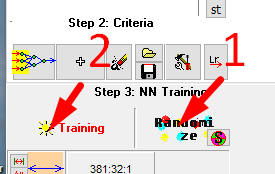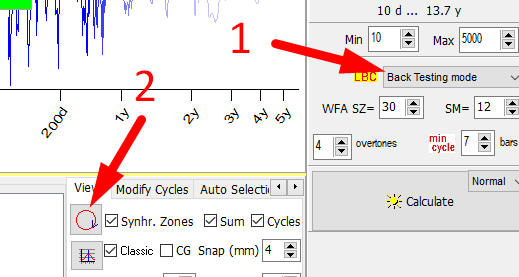
Reaction effect
When you make a forecast using Neural Network technology, you need always remember about some effect that takes place there. I could not find any definitions of this effect among available Neural Net technology information, so let us call this effect as "a reaction".
This is what it looks like:

The projection line indicates an immediate drop after LBC. It looks suspicious to me. This phenomenon takes place when we have long up or down trend movement, especially if it is parabolic. In this case, most of cyclical models will indicate an immediate opposite movement, suggesting the end of that trend. This situation can be considered as a mathematical artifact, not a real forecast; and this is what I call a reaction effect.
Here are two possible solutions of this problem:
Solution #1: try to set LBC in different places and recalculate projection line for each position. If you get the same situation - the projection line shows the end of trend immediately after LBC, - we definitely have a reaction effect here. In the example below we moved the LBC position to the beginning of August and got exactly the same - a drop immediately after LBC:

So we recommend to set LBC away from a zone of strong trend, to avoid a reaction effect; something like this:

Recommendations for Timing Solution users:
You can update a projection line after changing LBC position this way:
In Neural Net module- after changing LBC position, click: 1) Randomize and train; then 2) train Neural Network again:

in Composite (Astronomy) module - Composite module updates a projection line automatically when LBC position is changed.
In Q-Spectrum module - 1) set this module in Backtesting module and 2) click this button:

Solution #2: try to consider cycles with longer periods, analyzing this trend as a part of a some bigger cycle. If you build a Neural Network or work with Composite model, exclude from the model all fast moving planets: try to use events that involve only such planets as Mars, Jupiter, Saturn,y and exclude events that use fast moving planets - like the Moon, the Sun, Mercury and Venus. If you work with Spectrum module, choose cycles with periods of 2 years and higher.